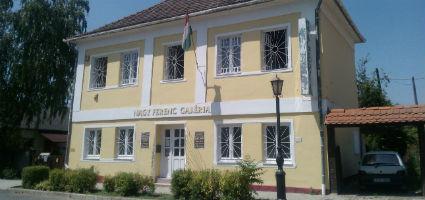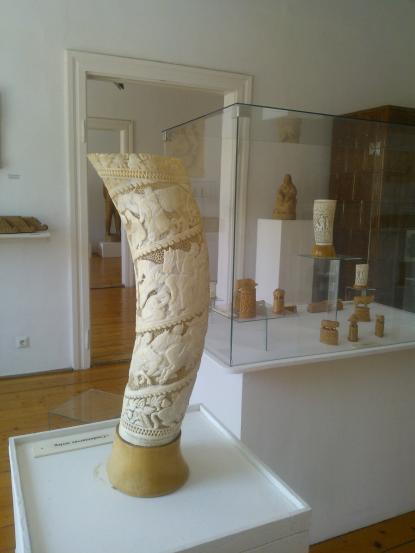2026. January 5. Monday
Ferenc Nagy Gallery - Tab
 |
Address: 8660, Tab Kossuth Lajos utca 93.
Phone number: (84) 320-416
E-mail: info@tabikonyvtar.hu
Opening hours: Tue-Sun 10-14
|
Museum tickets, service costs:
|
Ticket for adults
|
500 HUF
|
|
|
Ticket for students
|
250 HUF
|
|
|
Ticket for pensioners
|
250 HUF
|
Ferenc Nagy was born on 5th October 1920. He spent his childhood on the plains of Somogy county. His parents were shepherds and domestic workers. At the age of elementary school he was drowing, modelling clay and carving wood.

He was called up to the army in 1941 and began to carve in the hours of rest. The imprisonment after the war proved to be a great releaf for him. He carved pipes, but even medical instruments, which he sold for foods. When he returned home in herdsmen 1946 he continued with the carving work. The famous carving masters of Somogy county (Antal Kapoli, Vendel Papp and his wife, and the Bognár brothers made a strong influence upon him.
From 1948 to 1950 he exhibited his works in the Popular Art House of Tihany. As a consequence of continuous orders he became a professional carver. He was thinking of studying sculptor arts, but instead he got married to a lady who became his companion in the carving art as well.
Ferenc Nagy achieved outstanding results in the field of wood, bone- and horn carving. He received the chief reward in the Youth Meeting held in Warsaw in 1955.
In his art he increasingly turned to religious topics. He made a good number of reliefs, corps, Madonnas and pietas. The secular topics also attracted the artist from many aspects. The statues made of couples, such as the Proud husbandman and his wife, or Being shy together, are really cheerful and humorous.He also much favoured historical topics.
The master died on 25th January 1998. His works can be seen in the Gallery named after him.

He was called up to the army in 1941 and began to carve in the hours of rest. The imprisonment after the war proved to be a great releaf for him. He carved pipes, but even medical instruments, which he sold for foods. When he returned home in herdsmen 1946 he continued with the carving work. The famous carving masters of Somogy county (Antal Kapoli, Vendel Papp and his wife, and the Bognár brothers made a strong influence upon him.
From 1948 to 1950 he exhibited his works in the Popular Art House of Tihany. As a consequence of continuous orders he became a professional carver. He was thinking of studying sculptor arts, but instead he got married to a lady who became his companion in the carving art as well.
Ferenc Nagy achieved outstanding results in the field of wood, bone- and horn carving. He received the chief reward in the Youth Meeting held in Warsaw in 1955.
In his art he increasingly turned to religious topics. He made a good number of reliefs, corps, Madonnas and pietas. The secular topics also attracted the artist from many aspects. The statues made of couples, such as the Proud husbandman and his wife, or Being shy together, are really cheerful and humorous.He also much favoured historical topics.
The master died on 25th January 1998. His works can be seen in the Gallery named after him.

